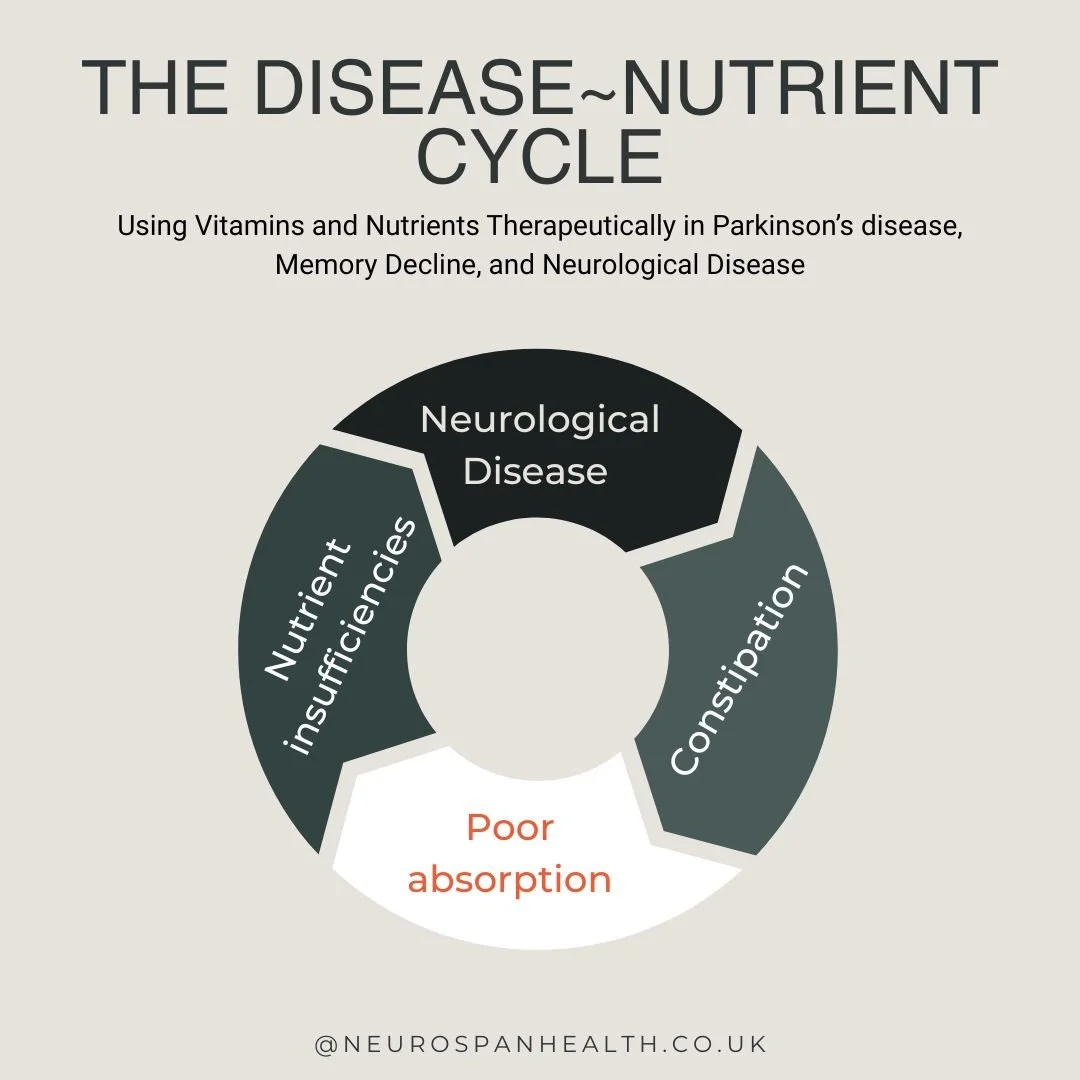How to fight neurological disease with Vitamins
Vitamins and nutrients are essential in Parkinson’s and neurological disease to build disease resilience and improve wellness, but many patients waste money on the wrong supplements before getting more specialist guidance.
The role of Vitamins are surprisingly under-estimated and understudied when it comes to their extraordinary powers in fighting disease. To fully understand their therapeutic potential, you need to first understand how they underpin body organs and the jobs that they do, followed by a deep understanding of how these organs and functions impact our nerve and brain health indirectly.
As Nutritionists, Vitamins and Nutrients form part of our specialism, and we’ve spent decades researching the many hundreds of functions of vitamins, minerals and phytonutrients, and mapped this to brain and nerve health.
In this article, we zoom in on two critical nutrients in neurological diseases in order to illustrate the many aspects we need to consider when choosing our supplements. We’ve also included mini case studies to help you choose your vitamins with more confidence.
Need more help choosing supplements?
The Forensic Approach to Fighting Disease with Parkinson’s Vitamins
In the UK, one in six people live with a neurological condition—affecting an estimated 16.5 million individuals, and it’s estimated (US figures) that 40% experiment with nutrients and supplement to support wellness. But many find recommendations overly broad and nutrient messages conflicting.
Our Whole-Body Approach - Identifying the Vitamin Needs
We take a different approach to using vitamins therapeutically, taking a ‘root-cause’ view and whole-body approach. For each of our Parkinson’s patients, we focus on identifying their unique gaps and imbalances, which helps us identify which vitamins will be therapeutic and ‘healing’ for them, avoiding wasted money and hopes.
We follow the symptoms.
…Here’s a real-world example to help us explain;
Case Example:
A 63-year-old Male came to us with frequent migraines and long-standing digestive issues resembling IBS — symptoms he had lived with for over 15 years. More recently, he had been diagnosed with fibromyalgia, experiencing fatigue, restless legs, and widespread body pain.
On taking the client’s case history, this is what we found:
Digestive issues: Tests revealed poor absorption, resulting in malabsorption. Not absorbing nutrients from his otherwise good diet, left him with shortfalls in Iron, Magnesium, and likely Calcium. What’s important here is to know that, you don’t have to be deficient to experience symptoms - a moderate shortfall is often all it takes.
Deficits in Magnesium and iron - can present as restless legs, joint pain, fibromyalgia, as well as a ‘feeling-sleepy’ type of fatigue that doesn’t typically improve after rest. This client experienced many of these symptoms, and symptoms improved significantly in just 2 weeks.
Why The Forensic Approach Matters
This case highlights how a symptom like fatigue—or a condition like fibromyalgia—can be linked back to gut health, via vitamins and minerals.
At our Parkinson’s Wellness Centre & Neurospan Health, every client provides us with their detailed case history (via electronic form, but can be recorded if typing is a challenge).
By taking a very thorough case history and listening carefully to your health story and timeline, we can pick out issues like these, allowing us to immediately alleviate something that’s been causing someone significant stress, sometimes for years.
This is how we use our forensic approach to root out what nutrients we need to use therapeutically. When choosing your vitamin supplements, try and consider the rest of your health and your diet.
A few Examples of Nutrients needed by our Brain and Nerves
To illustrate the role in nutrients in fighting neurological disease, we give you two sample nutrients:
Vitamin B12
A key nutrient in keeping our nerves insulated. As you may recall from your school days, electric currents need to be insulated to work. Checking your B12 levels is absolute key if you have MS. We can’t emphasise this enough. You might also want to consider carrying out a B12 test called MMA (as well as a regular B12 blood test). This is considered a more accurate measure.
As well as checking B12 levels, we’d highly recommend carrying out a genetic test as well. A gene test can give you important insights into how you process and ‘keep’ your B12 . Since MS is a disease that affects nerve insulation and B12 is required for our body to maintain this insulation, you can imagine the importance of optimal B12 levels at all times. It’s not a cheap test, but what could be more important than your health.
What are the symptoms of insufficient B12?
You’ll be experiencing fatigue (‘sleepy type fatigue’ but you might also feel flat or have low motivation). You may also experience tingling in hands or arms, and/or brain fog.
……We give you another case study example:
Client 2 is a Male, 42yrs old, with two young children. He was diagnosed with MS some years back, and is now experiencing fatigue along with pain under the soles of their feet. This was preventing sleep and working out at the gym to feel fit and healthy.
Client’s Test Results Revealed:
A frank B12 deficiency
Some very ‘iffy’ genes around methylation, which included processing and ‘keeping’ B12 stored in the body for use.
The Outcome:
This client needed to top up B12, plug other nutritional gaps that helps support B12 body storage, as well as highlighting the need for frequent monitoring. In this case, it was also essential to re-test his B12 after supplementing, to ensure the supplement was sufficient to achieve optimal levels. Keeping an eye on his B12 was life changing for this client.
Being a young person with young children, keeping on top of his disease is critical. With low B12 levels, not only could he not be the father he wanted to be, nor feel as fit as he wanted to, but he could also inadvertently be progressing his disease faster than need be.
…Other risk factors to watch out for in a hypothetical case would be;
Being a vegan or vegetarian with naturally low sources of B12. Digestive concerns, such as low stomach acid, taking PPI’s for heartburn, or very severe, chronic constipation (which of course is common in both MS and Parkinson’s), as these can affect absorption, including from a supplement.
…Next we discuss a mineral;
Calcium
One of our favourite 'mystery' nutrients. Why "mystery"? Because when we say calcium, you probably think of just two things: milk and bones.
But is that really all calcium does for us?
The answer is a HUGE, ENORMOUS ‘no’.
…calcium is so important it even has its own organ (regulatory organ).
This is pretty impressive and unique in the body. This organ (parathyroid gland) is completely dedicated only to ensuring we have enough calcium available for important functions.
So what are the other functions?
Strangely— calcium only gets a small mention in dietetics textbooks, beyond the usual references to dairy and bone health.
So, we decided to dig deeper.
We turned to the scientific literature, combing through study after study to learn more.
And the more we looked, the more we found.
Calcium for Nerve and Brain Health
Beyond bones and teeth, calcium operate our nerves and neurons.
In fact, calcium is so essential for nerve function, the body keeps its levels within a very narrow range at all times. If dietary intake falls short, your body won’t hesitate to steal calcium from your bones to protect vital nerve functions.
Diet Sources of Calcium beyond Dairy
Dairy isn’t the only source of calcium, we also rely on plants and dark green leafy vegetables.
Calcium from plants however, isn't always easy to absorb. A healthy gut bacteria has been found to be involved in increasing extraction from calcium from your plant foods. If you have issues with digestion - you might want to pay attention. Or even better - analyse your microbiome via a test.
What else our research discovered: Other Roles of Calcium
Calcium helps our neurons work. They are crucial also in regulating neurotransmitters. This means that, if you have an imbalance in brain chemicals such as dopamine and acetylcholine - consider calcium (diet, absorption, etc).
This study shows a shocking discovery: Calcium has a KEY role in keeping the blood-brain barrier (BBB) tight, safe and secure from invaders and toxins. If you have a brain disease, this is very relevant.
Calcium is needed for good gut motility (constipation!) as well as avoiding leaky gut. Leaky gut has been correlated with auto-immune disease.
Interestingly, calcium plays a crucial role in women’s health and hormones. In PCOS, we often see a deficiency in (i.e VERY low) Vitamin D (helps us absorb Calcium). The connection here, is that calcium deficiency has been correlated to impaired insulin (PCOS and Hormone imbalance). If you are an early-onset Parkinson’s lady, you might want to pay attention to this :).
This is just a small sample of how vitamins can be used therapeutically in fighting neurological disease.
Which Vitamins will ‘work’ for me?
Vitamins aren’t just something we need for strong bones and teeth - they form part of the complex functional matrix that make up the human body, as well as disease.
Being the foundation of health and in fighting disease, we must plug nutritional gaps if we want to increase disease resilience and aim to slow down progression.
In the above examples, we hope you found a take-home for your self-care or feel inspired to see vitamins as something bigger.
…Will they ‘work’ for you?
So this is important; Vitamins will not ‘work’ or change how you feel - unless you need them.
If you have an increased physiological need (we would assess), increased loss, or a poor ability to process or absorb your food - this may be you.
Of course, a healthy diet is paramount - but it’s not always enough!



